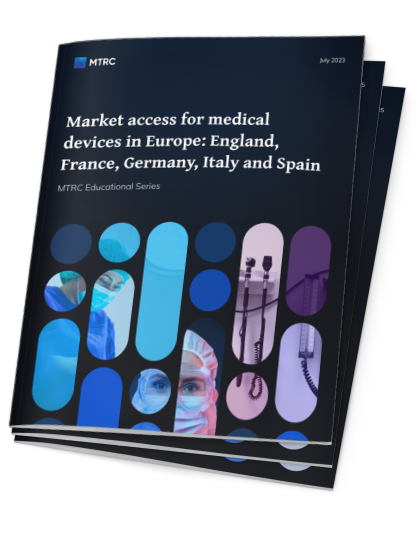
Key Topics
There are three key themes describing market access for medical technologies in Germany:
- Reimbursement: payment mechanism via DRG system, add-on reimbursement via ZE in hospital settings; payment via EBM catalog in out-patient settings
- Funding: coverage decisions within statutory health insurance by the Federal Joint Committee (G-BA)
- Health technology assessment: assessments by IQWiG in relation to the creation of out-patient reimbursement codes
Germany has a number of innovative payment schemes for medical technologies.

Reimbursement
Reimbursements for hospital procedures are made solely via a German-diagnosis-related group (G-DRG) system. All cases of hospitalization with at least one overnight stay are reimbursed via DRG. Day cases and out-patient care are completely separate from hospital care provisions and are reimbursed via a fee-for-service model (EBM catalog within the statutory health insurance).
The DRG system has the following components:
Diagnosis-related groups
- DRGs are determined by the combination of a procedure code (OPS) and a diagnosis code (ICD-10-GM). OPS nomenclature is maintained by the BfArM Cologne Office (ex DIMDI) and released annually
- Most DRGs have a national tariff, which is determined by the administrator of the DRG system, the Institute for the Hospital Remuneration System (InEK)
Add-on reimbursement (Zusatzentgelt, ZE)
- Add-on reimbursement is provided for expensive devices, procedures, and drugs
- ZE might or might not have a national tariff
The G-DRG system is approved annually.
Innovation funding (NUB) is not formally part of the DRG system. NUB is granted by InEK for a period of less than a year based on the review of applications made by hospitals. Approved status (status 1) gives hospitals the opportunity to negotiate additional reimbursement with sickness funds. However, it does not guarantee reimbursement, as sickness funds may question the sufficiency of the evidence provided and decide not to pay for the technology.
In out-patient settings, procedures are reimbursed via a fee-for-service mechanism via the EBM Catalog. There are specifics of reimbursement for surgical procedures in day case settings.

Funding
From 2016, the national policy-maker, the Federal Joint Committee (Der Gemeinsame Bundesausschuss, G-BA), may initiate a “benefit assessment” procedure for applications dealing with devices from high-risk classes (IIb and III). This would ensure that the level of evidence is sufficient for the device’s use in the German statutory health insurance system.

Health Technology Assessment
HTA is almost exclusively limited to assessments by IQWiG in relation to the creation of out-patient reimbursement codes.

Specifics for IVD Tests
In-vitro diagnostic tests are reimbursed using a fee-for-service mechanism via the EBM Catalog in out-patient settings.
Get Insights from MTRC Free Analytical Reports
Gain in-depth insights into market access challenges and evidence requirements for medical technologies in Germany with free MTRC analytical reports and white papers

Explore MTRC research papers:
- Market access for medical devices in Europe: England, France, Germany, Italy and Spain (Report #1)
- Market access for in-vitro diagnostic tests in Europe: England, France, Germany, Italy and Spain (Report #8)
- Case study: Market Access for Preeclampsia Predictive Tests in Germany and Norway (Report #23)
- Government-co-funded studies according to the §137e in Germany (Report #27)
- Reimbursement of Day Case Surgery Procedures in Europe (Report #33)
MTRC has experience with more than 359 projects in Germany
How can MTRC Help?
Development of reimbursement analysis (procedure coding, payment mechanism, reimbursement tariffs, policy and HTA considerations)
Development of market access strategy
Development of the health economic model in the German settings
Adaptation of the global health economic model to the German settings
Access to an educational seminar on the German reimbursement system
Get in Touch
Contact us to discuss your needs and learn about our services



